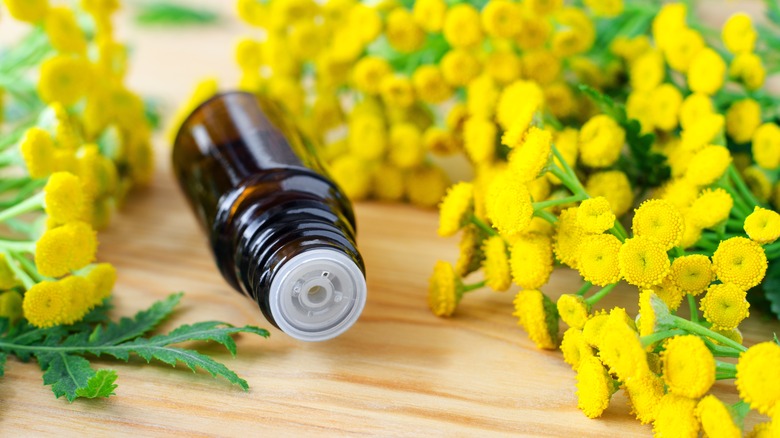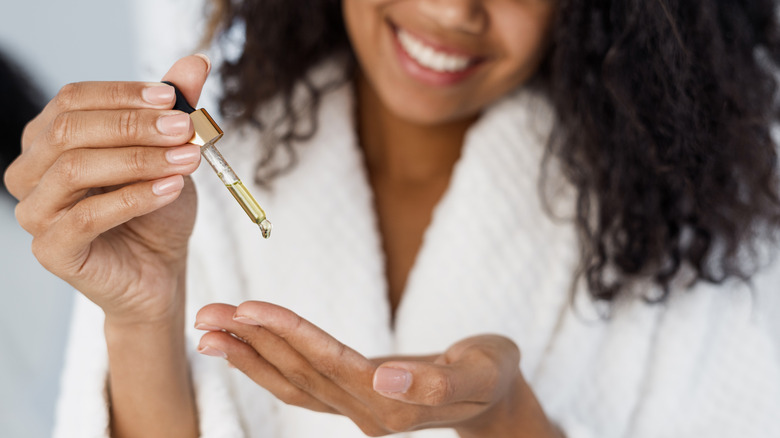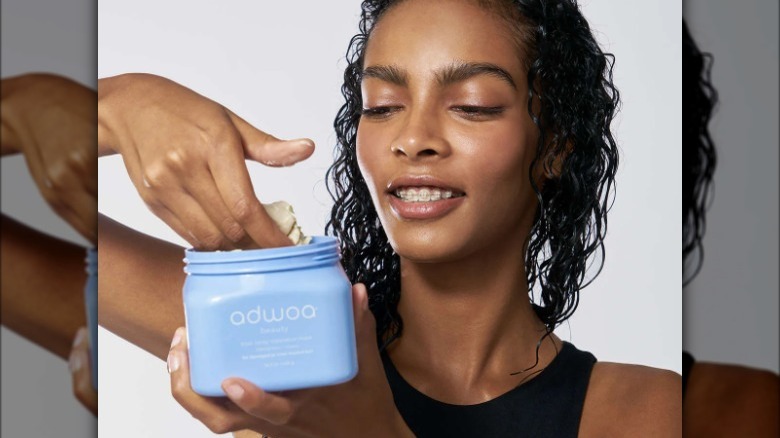Is Blue Tansy Oil Worth The High Price Tag?
We may receive a commission on purchases made from links.
Plant-based medicines, skin products, and beauty products are nothing new. Essential oils have been used for thousands of years in the Middle East, Africa, and Asia, but they've only recently been packaged in glass vials and marketed by Western brands on social media, per The New York Times. "People sometimes discount these things, until someone from the West does it," explains founder of M.S. Skincare, Anit Hora — Ayurvedic medicine was a part of her family for generations before it was ever marketed on Amazon. The essential oil industry is massive, but does the popularity of these products speak to their efficacy?
Due to its scarcity, blue tansy oil is one of the more expensive essential oils on the market. It's derived from the blue tansy plant, a relative of chamomile native to Morocco. Believe it or not, the flowers on the blue tansy are yellow — the oil only turns its signature color during the distillation process, per Healthline.
In recent years, blue tansy has been mass marketed as a solution for acne, stress, and even congestion. But is it worth the exorbitant price tag, or are other products equally as effective?
Blue tansy can calm irritated skin if diluted correctly
Through distillation, a plant's scented oils are extracted. But because essential oils are extremely potent and potentially damaging on their own, it's often necessary to mix them with a less concentrated carrier oil like coconut, jojoba, or almond (among others) before applying them directly to the skin (via Healthline). Blue tansy oil is no exception, and even the pricey options are blended with other oils. Sunday Riley's Luna Sleeping Night Oil – which retails for $55 — is watered down with products like avocado and grape seed oil. Alternatively, Herbivore Botanicals dilutes their $72 Blue Tansy Face Oil with kukui nut oil.
As Healthline warns, make sure vegetable oil isn't mixed in — this will decrease the product's efficacy. Another pro tip: avoid bottles that read "Tanacetum vulgare," which means "common tansy" in Latin. Instead, opt for "Tanacetum annuum," a rarified form.
Though priced higher than acne-fighting products like salicylic acid or benzoyl peroxide, board-certified dermatologist Dendy Engelman notes that blue tansy oils are ideal for irritated skin. As she tells Refinery29, "Blue tansy helps to clarify the complexion and reduce redness in irritated skin without over-drying," adding, "[it's] is great for acne-prone skin as it has the ability to clear congested pores and kill off bacteria that causes pimples. Thanks to a compound called camphor, blue tansy also has skin-healing properties that make it a good ingredient to use on sunburned skin."
While it's far safer to buy pre-diluted essential oils for skin, you can mix a drop of highly concentrated blue tansy oil with your daily moisturizer – Plant Therapy recommends diluting between 2% and 4% in your carrier of choice.
Incorporate blue tansy oil into your haircare routine
On top of helping with conditions like acne, rosacea, eczema, and psoriasis, blue tansy oil can be an important step in any hair care routine. "I began using blue tansy flower oil in 2016 and experienced the wonderful skin-care benefits myself," Julian Addo remembers. As the business owner goes on to disclose to Refinery29, "At the time, I was conceiving Adwoa Beauty and knew I wanted to use this in hair care, for [specifically] scalp care."
These days, Addo focuses on scalp care, selling products like the blue tansy clarifying gel shampoo and the blue tansy reparative hair mask. Though on the pricier end of the haircare spectrum — a 16-ounce bottle of shampoo retails for $25 while a 16-ounce tub of the reparative mask sells for $40 — reviewers on the brand's website claim it's well worth the price tag.
Los Angeles-based dermatologist Ava Shamban, MD, agrees. "Its distilled essential oil is soothing, nourishing, and rich in texture," she informs Byrdie. "When used on hair and scalp, blue tansy will absolutely keep the keratin protein softer and more subtle, and the strands more elastic. So it may stop breakage and offer the best support for growth and regrowth." Over time, it can also help with dandruff. Though be warned: if you have bleached hair, blue tansy oil might leave behind a bluish tint.


